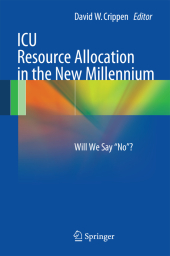 Neuerscheinungen 2012Stand: 2020-01-07 |
Schnellsuche
ISBN/Stichwort/Autor
|
Herderstraße 10
10625 Berlin
Tel.: 030 315 714 16
Fax 030 315 714 14
info@buchspektrum.de |

David W. Crippen
ICU Resource Allocation in the New Millennium
Will We Say "No"?
Herausgegeben von Crippen, David W.
2012. xxiv, 351 S. 2 SW-Abb., 9 Farbabb., 20 Tabellen. 235 mm
Verlag/Jahr: SPRINGER, BERLIN 2012
ISBN: 1-461-43865-9 (1461438659)
Neue ISBN: 978-1-461-43865-6 (9781461438656)
Preis und Lieferzeit: Bitte klicken
As economic woes increase the constraints on escalating healthcare costs in the US and Europe, this volume sizes up the prospects for intensive care units whose sustainability is doubted by policymakers as much as patients´ need for ICUs continues to rise.
Intensive care medicine is one of the fastest growing services provided by hospitals and perhaps one of the most expensive. Yet in response to the global financial crisis of the last few years, healthcare funding is slowing or decreasing throughout the world.
How we manage health care resources in the intensive care unit (ICU) now and in a future that promises only greater cost constraints is the subject of this book, the third in an informal series of volumes providing a global perspective on difficult issues arising in the ICU.
Taking 12 developed countries as their focus, leading experts provide a country-by-country analysis of current ICU resource allocation. A second group of experts use the chapters as a departure point to analyze current ICU resource allocation at the level of the global medical village. The process is repeated, but with an eye toward the future - first country by country, then at the global level - that takes into account initiatives and reforms now underway.
A fictional healthcare plan, the "Fair & Equitable Healthcare Plan," is put forth to address weaknesses in existing approaches, and healthcare experts and ethicists are invited to respond to its often provocative provisions.
Itself structured as a dialogue, the book is an excellent way to start or to continue serious discussion about the allocation of ICU healthcare resources now and in the years ahead.
From the reviews:
"This monograph challenges the critical care community to evaluate the technical, moral, and financial limits of critical care. ... Trainees, policy makers, and medical practitioners are an appropriate audience for this book, which features international perspectives on critical care resource utilization. ... This book effectively frames the question of resource limitation and offers a short list of strategies to address this concern in the future." (David J. Dries, Doody´s Book Reviews, April, 2013)
"Simply compelling! ... dynamic, balanced, and stimulating ... challenges readers to question ´how things are done´ and ´how things should be done´ in the ever changing financial and ethical world of the ICU. ... not only a must read for ICU clinicians of all disciplines but also for health economists, health policy makers, ethicists and even the lay public." (Richard J. Brilli, Critical Care Medicine, Vol. 41 (4), April, 2013)
"It would appeal to individuals with an interest in the different systems of health care delivery, particularly from a global perspective. This book would also serve as an excellent foundation for anyone researching various care models throughout the globe. ... intensive care physicians who wrestle daily with questions on how to deliver care in a system with limited resources and ever expanding patient expectations will take great interest in this book." (Donald Griesdale, Canadian Journal of Anesthesia/Journal canadien d´anesthésie, Vol. 60, 2013)


